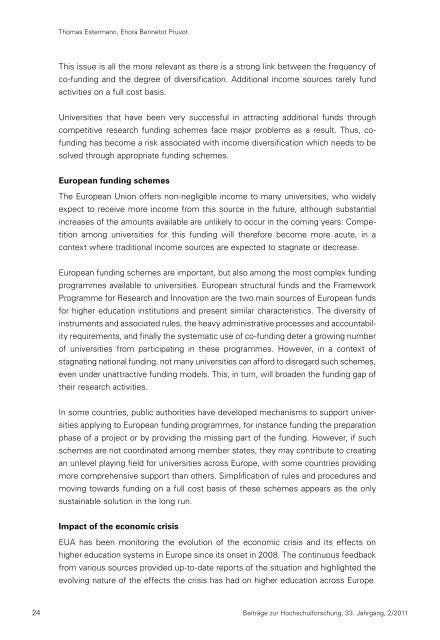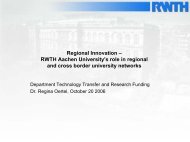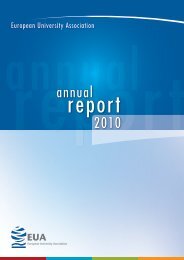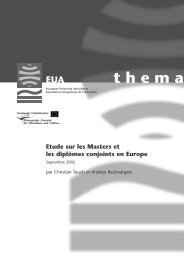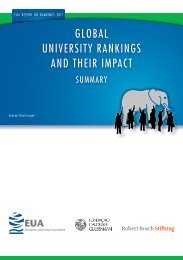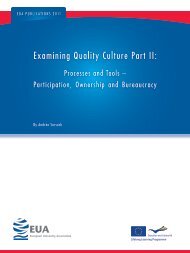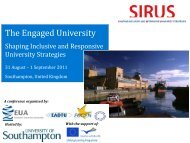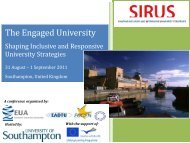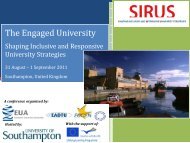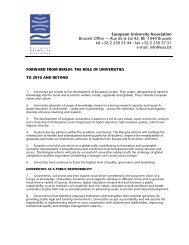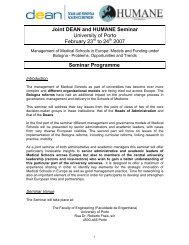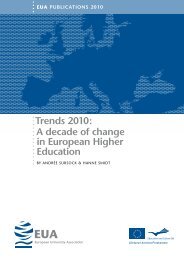Beiträge zur Hochschulforschung - European University Association
Beiträge zur Hochschulforschung - European University Association
Beiträge zur Hochschulforschung - European University Association
Create successful ePaper yourself
Turn your PDF publications into a flip-book with our unique Google optimized e-Paper software.
24<br />
Thomas Estermann, Enora Bennetot Pruvot<br />
This issue is all the more relevant as there is a strong link between the frequency of<br />
co-funding and the degree of diversification. Additional income sources rarely fund<br />
activities on a full cost basis.<br />
Universities that have been very successful in attracting additional funds through<br />
competitive research funding schemes face major problems as a result. Thus, co-<br />
funding has become a risk associated with income diversification which needs to be<br />
solved through appropriate funding schemes.<br />
<strong>European</strong> funding schemes<br />
The <strong>European</strong> Union offers non-negligible income to many universities, who widely<br />
expect to receive more income from this source in the future, although substantial<br />
increases of the amounts available are unlikely to occur in the coming years. Compe-<br />
tition among universities for this funding will therefore become more acute, in a<br />
context where traditional income sources are expected to stagnate or decrease.<br />
<strong>European</strong> funding schemes are important, but also among the most complex funding<br />
programmes available to universities. <strong>European</strong> structural funds and the Framework<br />
Programme for Research and Innovation are the two main sources of <strong>European</strong> funds<br />
for higher education institutions and present similar characteristics. The diversity of<br />
instruments and associated rules, the heavy administrative processes and accountabil-<br />
ity requirements, and finally the systematic use of co-funding deter a growing number<br />
of universities from participating in these programmes. However, in a context of<br />
stagnating national funding, not many universities can afford to disregard such schemes,<br />
even under unattractive funding models. This, in turn, will broaden the funding gap of<br />
their research activities.<br />
In some countries, public authorities have developed mechanisms to support univer-<br />
sities applying to <strong>European</strong> funding programmes, for instance funding the preparation<br />
phase of a project or by providing the missing part of the funding. However, if such<br />
schemes are not coordinated among member states, they may contribute to creating<br />
an unlevel playing field for universities across Europe, with some countries providing<br />
more comprehensive support than others. Simplification of rules and procedures and<br />
moving towards funding on a full cost basis of these schemes appears as the only<br />
sustainable solution in the long run.<br />
Impact of the economic crisis<br />
EUA has been monitoring the evolution of the economic crisis and its effects on<br />
higher education systems in Europe since its onset in 2008. The continuous feedback<br />
from various sources provided up-to-date reports of the situation and highlighted the<br />
evolving nature of the effects the crisis has had on higher education across Europe.<br />
<strong>Beiträge</strong> <strong>zur</strong> <strong>Hochschulforschung</strong>, 33. Jahrgang, 2/2011


